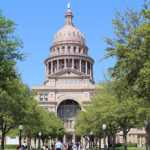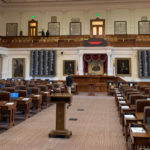With about one month remaining in the 87th Texas Legislative Session, lawmakers in the House and Senate still need to resolve differences about how and whether to spend available federal funds.
The Texas Senate on April 6 unanimously recommended a two-year $250 billion state budget that does not factor in about $38 billion in federal coronavirus aid. After considering 245 amendments, the House of Representatives proposed a $246 billion two-year budget.

The budget proposals now go to a conference committee to reconcile differences before returning to both chambers for final approval prior to the end of the session on May 31.
“The biggest/latest thing happening now with the budget is the rejection of Medicaid expansion,” said Michael Evans Jr., public policy director for the Texas Baptist Christian Life Commission.
Failure to expand Medicaid “will negatively affect the working-poor in this country” and deny protection to “the people who need it most and who keep America running,” Evans said.
Texas lawmakers have declined to pass any significant expansion of state and federal health care coverage for the uninsured since the Affordable Care Act of 2010 mandated state expansion of Medicaid—a provision the U.S. Supreme Court later struck down.
The House voted 80-68 after brief debate to reject a budget amendment by Rep. Garnet Coleman, D-Houston, that would have directed the governor and state health officials to use federal funds to expand coverage for the uninsured, including the working poor who cannot afford their own health insurance but earn too much to qualify for Medicaid.
‘Great victory’ for public education

The House voted overwhelmingly in favor of an amendment by Rep. Abel Herrero, D-Robstown, to prohibit any state funds from going toward private schools through voucher programs, a move applauded by Charles Foster Johnson, founding executive director of Pastors for Texas Children.
“In 2017, 44 House Republicans voted against the Herrero amendment to ban private school vouchers. This year, that number shrank to 27,” Johnson said.
Sign up for our weekly edition and get all our headlines in your inbox on Thursdays
Significantly, the House approved a budget amendment earmarking $18 billion in federal coronavirus aid for public education. The House also adopted an amendment that would require legislative approval for the distribution of any additional federal relief money that arrives after the conclusion of the legislative session on May 31.
“A budget is a moral document. It illustrates our priorities as a society,” Johnson said. “Bringing children up to grade level after the losses during the pandemic will require an infusion of federal dollars. That’s what these funds are meant for. These are our children, and these are our tax dollars. This is a great victory.”
House committee considers sports betting, casinos
In addition to dealing with the state budget, lawmakers also will consider a variety of other bills in the remaining weeks of the session.
The House State Affairs Committee in mid-April heard testimony on HJR 97, which proposes a constitutional amendment legalizing sports betting in Texas, and HJR 133, which would create the Texas Gaming Commission and authorize a limited number of casinos licensed by the commission. Both bills remain in committee.
Rob Kohler, consultant with the CLC, told lawmakers the sports betting bill “sends a bad message to the youth of the state” and turns professional sports teams into “the state’s online bookies.”
Significantly, Kohler warned, if the state permits legalized sports gambling, it automatically opens the door to Native American tribes operating casinos by triggering a change in classification under the Indian Gaming Regulatory Act of 1988.
Kohler also disputed claims that allowing casinos in Texas would provide a windfall in tax revenue. Based on a 25 percent tax and a 93 percent prize payout, casino gambling slot machines would require 14 times the annual sales of the state lottery to generate the same among of revenue to the state, he noted.
Rodger Weems, chairman of Texans Against Gambling, told lawmakers estimates of income from legalized gambling invariably are inflated by promoters, while social costs are downplayed.
The House State Affairs Committee heard testimony the day before the Las Vegas Sands gambling corporation launched a multimillion-dollar advertising campaign in an effort to build support for casinos in Texas.

Other bills the CLC is tracking include:
- HB 4116, which prohibits a credit service organization from obtaining an extension of credit for a consumer or assisting them in obtaining an extension of credit unless they are licensed.
- HB 1239, known as the “Freedom to Worship Act,” relates to the prohibited suspension of laws protecting religious freedom and prohibited closure of places of worship.
- HB 88, known as the “George Floyd Act,” relates to interactions between law enforcement and individuals detained or arrested and the officers’ liability for those interactions.
- HB 686, also called the “Second Look Bill,” creates the possibility of changes in parole eligibility for certain inmates convicted of an offense when younger than age 18.
Editor’s note: The 9th paragraph was edited after it originally was posted.














We seek to connect God’s story and God’s people around the world. To learn more about God’s story, click here.
Send comments and feedback to Eric Black, our editor. For comments to be published, please specify “letter to the editor.” Maximum length for publication is 300 words.